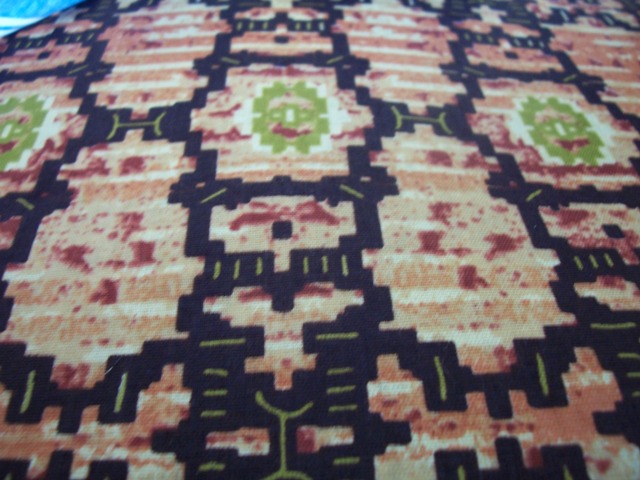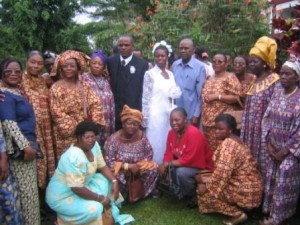Archive for September, 2005
What I Like About Douala
Monday, September 19th, 2005Douala isn’t really a tourist city. There aren’t any cultural attractions that I’ve heard of since I’ve been here. Not that I’ve really investigated a lot, but everyone always talks about going to Kribi or Limbe, not touring Douala. It is, however, a city of neighbourhoods that each have their own atmosphere and sometimes specific kinds of businesses.
We live in Makepe (the ‘burbs), pass through Deido, Bonamoussadi and Rond Point to get to Bonanjo (the city). Akwa is largely a shopping district right downtown. I like the people, mostly young men, who walk around with items to purchase in their hands and on their heads. Everything from candy and tissues to running shoes to handbags to peanuts to linens and pillows. There are also carts with hardware, shopping bags, pineapple, papaya, oranges or apples.
I like how the taxi drivers take their cars over the most daunting roads, braving things that look too big to be potholes.
I like the restaurants that put the day’s menu on a chalkboard outside and serve the yummiest food for $5 -7 dollars a plate.
I like internet cafes with English keyboards–for obvious reasons.
I like all the wonderful fabrics people use to make the clothes. Usually the women’s clothes are African style and very creative. The men’s are usually short-sleeved shirts that are worn large and untucked. Sometimes the men wear long tunics over pants and look very festive. Women tie their hair in the same or a matching fabric to their outfits.
I like that people say “Bonjour” or “Bonsoir” to everyone when they get into a taxi.
September 22, 2005
I like that you can see people (usually men) making beds, armchairs, armoires, even the big iron gates at the front of people’s houses. There are parts of the city where you can see them when you are just driving by on the road. They make everything from woven rattan type furniture to upholstered sets in whatever fabric you choose.
Whinging About Everything*
Friday, September 9th, 2005* Disclaimer: I reserve the right to love where I am and contradict my opinion on any of these matters at my whim without notice.
September 9, 2005
I hate motos: they are the motorbike taxis that are everywhere in Douala. They spew noxious fumes, their drivers are maniacs on the road, and they want the same fare as cars while subjecting you to wind, rain and dirt.
People can be so rude and pushy and what’s worse they watch you to see if you’ll say anything. This of course is a pet peeve of mine and I think it might be an unavoidable experience of life in the big city. (A woman in Yaounde actually walked by five people, including me, waiting in line for the ATM and used it. I was so happy when her card didn’t work.)
I hate sitting in the front seat of the taxi because you usually have to share it with someone. And it’s a bucket seat in a Toyota. If you’re the person on the inside, your left butt cheek is hanging over the seat and you’re trying to stay out of the way so the driver can shift.
I hate people talking about me in French and thinking I won’t notice. I don’t feel bad about interjecting into the conversation (in French) as though I was meant to be part of it all along. The best part is when I only understand one part of something, but when I comment it makes everyone feel that I know what they’ve been saying all the time.
October 6, 2005
I’ve been saving this one for a few weeks . . . I really think it’s possible that the men of Cameroon, have an unacknowledged urinary infection–it is epidemic the number of them that need to pee at the side of the road in any given day. And I’m not talking you happen to see someone behind a large tree; I mean you are walking along the sidewalk and some guy has turned towards the wall and unzipped his pants. Strangely enough, women don’t seem to be overtaken by this bladder urgency . . .
What do these people have against toilet seats–even in quite nice hotels. I guess it makes the leaving it up or down a moot point, but it’s NOT RIGHT . . .
Everybody in the Wedding Party
Thursday, September 8th, 2005The wedding planning is coming along nicely and we’ve reserved a great location for the reception. The Cameroonian custom at wedding ceremonies is that the bride and groom choose a fabric for close family and friends. Well, it’s assumed that the bride chose it, but the groom is in the store too. When you send the wedding invitations you enclose a swatch of the fabric, and people can choose to buy it and wear an outfit made from the chosen fabric to the wedding ceremony. The “uniform” shows that people are part of the ceremony and supporters of the bride and groom. Then, for the evening festivities, everyone shows up in their own individual finery.
Being the clueless foreigner, I chose a fabric that is outside the normal range of prices for such things. It’s 5900 CFA (about $13-14) for 6 yards of fabric, 45″ wide. To my Canadian viewpoint this is an excellent price for fabric. In Cameroon it is definitely the high end of the scale and the cost of uniform fabric is usually more like 4 – 4,500 CFA. However, everyone has commented that the fabric is lovely and it’s going like blazes.
I chose an red/orange/brown version of a pattern that also comes in violet/blue/black, and the version I chose has disappeared out of the stores. The people at the fabric store thought that people were buying it for our wedding. We don’t think so. So I’m keeping my eye out for another wedding in the near future, wearing MY fabric. Except for the people that bought in the very beginning most people will be wearing the second version. My mom will have something made when she arrives before the wedding as well. So let me know if you’re coming and we’ll set aside some fabric for you!
I’m excited to see what everyone makes of it. I can guarantee that there will be pictures.

Bon Appetit!
Thursday, September 8th, 2005I like food. I like people who like food–you know who you are. There are all the usual things: chocolate, cheesecake, blueberry pancakes, turkey bacon, butter chicken, the crespelle at Gio’s, etc. I am about to go on about the new foods (and new variations) I’ve discovered while I’m here. And if you think I’m going over the top, just think to yourself that I was originally going to write a whole post called “Ode to a Plaintain”.
About the plaintain–it’s the ubiquitous side dish here, like french fries or grits. It can be boiled or fried, green or ripe, pounded, eaten whole, sliced.
I knew I really liked Cameroon when I found out that my childhood favourite from Trinidad, fried plaintain, could be served with almost anything. Fried plaintain is usually made with a ripe plaintain that is quite sweet. The plaintain is sliced on the diagonal and cooked in a frying pan until the outside of the plaintain is brown and crispy and the inside is soft and yummy. There are lots of places to buy fresh plaintain and make it yourself. If you are in Douala, you take a taxi to COAF (quoif) and there’s a market there with all the necessaries. Green plaintain can also be boiled and eaten like potatoes as a side dish. You can also boil ripe plaintain and then fry it whole as a side, or just eat it boiled. (You get the idea.)
If you don’t like fish, Cameroon will be a very challenging and less tasty place for you. Cameroonians do many very yummy things with fish. The most popular types are mackerel, sole, bass and herring. Mackerel and bass are both used to make my favourite Cameroonian fish dish, poisson braisee. Mackerel is MUCH cheaper than bass and so is used more often. First, they take a whole fish and clean it thoroughly, then they use salt and an incredible rub marinade and cook the fish over a charcoal fire. William’s aunt has a place in Bonamoussadi that we usually go to and we get to sit in the cook shack. I like this for two reasons: it smells really good and the smoke keeps mosquitoes away. The fish is served with thin slices of onion, chili sauce and sides–either miandor (sp?) or fried plaintain. I usually get both.
Miandor is made from the casava or manioch plant. It’s in long strips and is actually kind of rubbery and tasteless, which makes it perfect for eating with savoury foods. I’ve never even heard of anything like it before. The process of making it is very involved, but in Douala it’s popular and usually available everywhere.
The other change my life dish is co-ci (ko-kee). Coci is like polenta, only I know it’s not made with cornmeal and it’s quite spicy. I was first served coci when I was in Cameroon last summer and William still laughs when he tells people how much I enjoy eating it. Because it’s so spicy, it’s usually served with something bland like boiled green plaintain or cassava.
My belle-souer, Yokoua, has made other dishes that I’ve really enjoyed. Fish can be served with sauce des tomates, which in Trinidad would be called “stew fish”, with sauce d’arachides and with mongo chobe (sp?). I’ve always loved stew fish and the peanut sauce is a very tasty variation. I enjoyed the mongo chobe, but it’s not going to appear in the top five anytime soon. Yokoua says that the main reason Cameroonians enjoy such a variety of dishes is the existence of the more than 200 tribes in the country. Each tribe has ways of preparing food that others made not have tried and the ones that become popular are known throughout the country.
The most challenging Cameroonian dish I have encountered is ndole (n-dolay), which is made with an extremely bitter plant that has to be washed and cooked and then mixed with a lot of ground peanuts to make a type of stew. You can still taste the edge of bitterness when you eat it. It sometimes has pieces of meat or fish in it for a full meal or it’s served as a side dish to a main meal. It’s enjoyable, but it’s not the kind of thing I could eat very often.
My willingness to eat so many Cameroonian dishes has made me a hit with the family, who are impressed with my openness to Cameroonian culture. My love of food has become an excellent way to overcome any language gaps.
